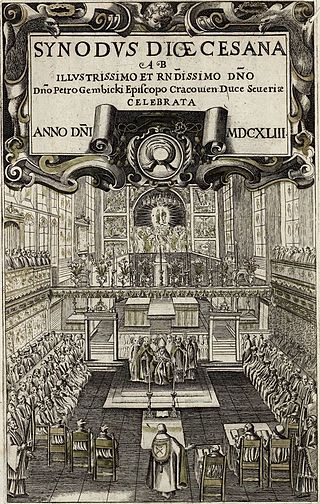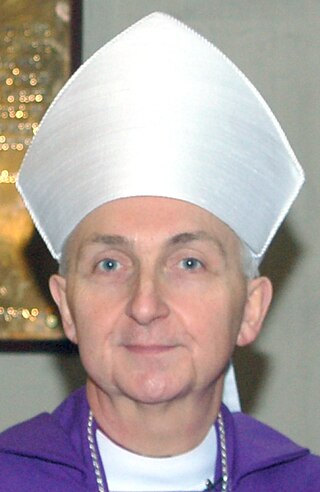
A synod is a council of a Christian denomination, usually convened to decide an issue of doctrine, administration or application. The word synod comes from the Ancient Greek σύνοδος 'assembly, meeting'; the term is analogous with the Latin word concilium'council'. Originally, synods were meetings of bishops, and the word is still used in that sense in Catholicism, Oriental Orthodoxy and Eastern Orthodoxy. In modern usage, the word often refers to the governing body of a particular church, whether its members are meeting or not. It is also sometimes used to refer to a church that is governed by a synod.
A vicar is a representative, deputy or substitute; anyone acting "in the person of" or agent for a superior. Linguistically, vicar is cognate with the English prefix "vice", similarly meaning "deputy". It also refers to a senior priest in the Church of England. The title appears in a number of Christian ecclesiastical contexts, but also as an administrative title, or title modifier, in the Roman Empire. In addition, in the Holy Roman Empire, a local representative of the emperor, such as an archduke, could be styled "vicar".
Canon is a Christian title usually used to refer to a member of certain bodies in subject to an ecclesiastical rule.
A churchwarden is a lay official in a parish or congregation of the Anglican Communion or Catholic Church, usually working as a part-time volunteer. In the Anglican tradition, holders of these positions are ex officio members of the parish board, usually called a vestry, parochial church council, or in the case of a Cathedral parish the chapter.

The General Synod is the tricameral deliberative and legislative organ of the Church of England. The synod was instituted in 1970, replacing the Church Assembly, and is the culmination of a process of rediscovering self-government for the Church of England that had started in the 1850s.

A dean, in an ecclesiastical context, is a cleric holding certain positions of authority within a religious hierarchy. The title is used mainly in the Catholic Church, the Anglican Communion, and many Lutheran denominations. A dean's assistant is called a sub-dean.
The appointment of Church of England diocesan bishops follows a somewhat convoluted process, reflecting the church's traditional tendency towards compromise and complex solutions, traditional ambiguity between hierarchy and democracy, and traditional role as a semi-autonomous state church.
In the Anglican Communion, the model of government is the 'Bishop in Synod', meaning that a diocese is governed by a bishop acting with the advice and consent of representatives of the clergy and laity of the diocese. In much of the Communion the body by which this representation is achieved is called the diocesan synod.
A deanery is an ecclesiastical entity in the Catholic Church, the Eastern Orthodox Church, the Anglican Communion, the Evangelical Church in Germany, and the Church of Norway. A deanery is either the jurisdiction or residence of a dean.

The Anglican ministry is both the leadership and agency of Christian service in the Anglican Communion. Ministry commonly refers to the office of ordained clergy: the threefold order of bishops, priests and deacons. More accurately, Anglican ministry includes many laypeople who devote themselves to the ministry of the church, either individually or in lower/assisting offices such as lector, acolyte, sub-deacon, Eucharistic minister, cantor, musicians, parish secretary or assistant, warden, vestry member, etc. Ultimately, all baptized members of the church are considered to partake in the ministry of the Body of Christ.
According to both Catholic and Anglican canon law, a cathedral chapter is a college of clerics (chapter) formed to advise a bishop and, in the case of a vacancy of the episcopal see in some countries, to govern the diocese during the vacancy. In the Catholic Church their creation is the purview of the Pope. They can be numbered, in which case they are provided with a fixed prebend, or unnumbered, in which case the bishop indicates the number of canons according to the rents. These chapters are made up of canons and other officers, while in the Church of England chapters now include a number of lay appointees.
The House of Clergy is the middle house in the tricameral Church of England General Synod legislature. It consists of representatives of the ordained clergy of the Church of England.

The post of Archdeacon of Chichester was created in the 12th century, although the Diocese of Sussex was founded by St Wilfrid, the exiled Bishop of York, in AD 681. The original location of the see was in Selsey. The see was moved to Chichester, in about 1075, by decree of the Synod of London. Currently, Luke Irvine-Capel is the Archdeacon.
In the Church of England and other Anglican churches, a deanery synod is a synod convened by the Rural Dean and/or the Joint Lay Chair of the Deanery Synod, who is elected by the elected lay members. The Synodical Government Measure 1969 makes it a statutory body.

The Anglican Diocese of Leeds is a diocese of the Church of England, in the Province of York. It is the largest diocese in England by area, comprising much of western Yorkshire: almost the whole of West Yorkshire, the western part of North Yorkshire, the town of Barnsley in South Yorkshire, and most of the parts of County Durham, Cumbria and Lancashire which lie within the historic boundaries of Yorkshire. It includes the cities of Leeds, Bradford, Wakefield and Ripon. It was created on 20 April 2014 following a review of the dioceses in Yorkshire and the dissolution of the dioceses of Bradford, Ripon and Leeds, and Wakefield.

Peter Burrows is a British retired Anglican bishop. He was the Bishop of Doncaster — the sole suffragan bishop in the Church of England Diocese of Sheffield — from 2012 until his 2019 retirement; from July 2016 until June 2017, he was also the acting Bishop of Sheffield.
Julian Tudor Henderson is a retired British Anglican bishop. From 2013 to 2022, he was the Bishop of Blackburn, the diocesan bishop of the Diocese of Blackburn in the Church of England. From 2005 to 2013, he was the Archdeacon of Dorking in the Diocese of Guildford.
Robert Wilfrid Springett is a British Anglican bishop. He has served as the Bishop of Tewkesbury since his consecration as a bishop on 30 November 2016. He previously served as the Archdeacon of Cheltenham in the same diocese from 2010.
The House of Bishops is the upper house of the tricameral Church of England General Synod legislature. It consists of all 42 Diocesan Bishops of the Church of England's Provinces of Canterbury and York as well as nine elected suffragan bishops. This is not to be confused with the Lords Spiritual, the most senior bishops in the Church of England sitting in the House of Lords ex officio.








